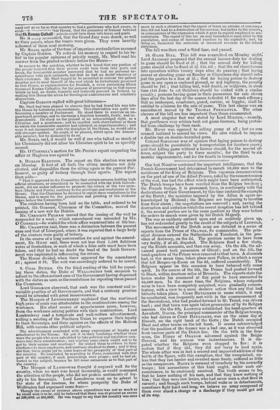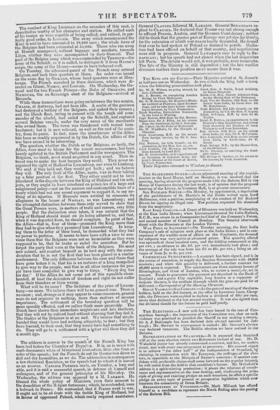Oar last Number contained the important intelligence, that the French
Government had determined to march 50,000 men to the assistance of the King of Belgium. This vigorous demonstration on the part of one of the Allied Powers, aided by the remonstrances of the rest, has had the effect which might have been anticipated. The Dutch troops have been recalled from the Belgian territory ; the French troops, it is presumed, have, in conformity with the declarations of their Government, by this time imitated the example of the Dutch ; the armistice imposed by the Allies is again ac- knowledged by Holland ; the 'Belgians are beginning to breathe from their alarm ; the negotiations are renewed ; and, saving the destruction and irritation which the recent irruption has left behind it, the several parties are in the same position as they were before the orders to march were given by his Dutch Majesty. The war so suddenly entered upon and so suddenly given up, has not redounded greatly to the credit of the subjects of LEOPOLD. The movements of the Dutch army are detailed in a series of reports from the Prince of ORANGE, its commander. The prin- cipal division entered the Netherlands at Turnhout, in the pro- vince of Antwerp, on the 3d. The position seems to have been very feebly, if at all, disputed. The Belgians fired a few shots, say the Dutch accounts, and then ran away. On the 4th, the ad- vanced guard took possession of Ghent ; and on the 5th, the head-quarters of the Prince were removed to that town. A skirmish had, in the mean time, taken place near Pullen, in which a corps that left Bergen-op-Zoom on the 3d, suffered considerably. The Belgians appear on this occasion to have behaved with some spirit. In the course of the 5th, the Prince had pushed forward to Diest, within fourteen miles of Brussels. The reports state the forces under his command at this point to have amounted to 40,000 men. In the mean time, the Belgians, whose outposts seem to have been completely surprised, were gradually concen- trating, with a view to a more decisive action than any that had hitherto taken place. CORT HEYLIGERS (a name which, it may be recollected, was frequently met with in the commencement of - the Revolution), who had pushed forward to St. Trond, was driven back ; and that town was again taken possession of by its Beligan masters. On the 8th, LEOPOLD established his head-quarters at Aerschott. DAINE, the principal commander of the Belgian troops, who had driven in CORT HEYLIGERS, was on the same day at Hasselt, on the right bank of the Gette ; the Dutch occupied Diest and other towns on the left bank. It seems acknowledged that the position of the former was a bad one, as it was observed. from various parts of the Dutch line. On the 10th in the fore- noon, the Prince of ORANGE advanced against theBelgic i General, and his success was instantaneous. It is dis- puted whether the Belgians even stopped to fire : it is certain that if they did, they did not tarry to load again. The whole affair was in fact a second and improved addition of the battle of the Spurs, with this exception, that the vanquished, un- less that they ran harder and sweated more freely, suffered as little as the conquerors. DAINE is accused of treachery by his cowardly troops ; but accusations of this kind ought, under such cir- cumstances, to be cautiously received. The truth seems to be, that he knew nothing of his men, and that they knew nothing of him ; that they were raw levies, who had never seen a shot fired in earnest ; and though such troops, behind walls or in detachments, sometimes fight hard and long, we believe no army composed of them ever stood a charge or a discharge if they could get out of its way. Tile conduct of King LEOPOLD on the occasion of this rout, is described as worthy of his character and station. He rallied such of his troops as were capable of being rallied, and retired, in per- fectly good order, to Louvain. The army which accompanied the King is said to have amounted to 18,000 men ; the whole force of the Belgians had been estimated at 35,000. Those who ran away at Hasselt scampered, without baggage and muskets, towards Litlge, whither they were accompanied by their General. That part of the Belgian army which was commanded by TERHOVE—the army of the Scheldt, as it is called, to distinguish it from DAINE'S corps, the army of the Meuse—seems to have behaved well. On Tuesday, the advanced guard of the French army entered Belgium, and took their quarters at Mons. An order was issued on the same day by GERARD, whose head-quarters were at Mau- beuge. The French marched in three divisions, which were di- rected on Ghent, Namur, and LouVain. On Wednesday, the Ge- neral and the two French Princes—the Duke of ORLEANS, and NEMOURS, the ex-Sovereign elect of the• Belgians—arrived at Brussels.
While these transactions were going on between the two armies, CHASSE, at Antwerp, had not been idle. A sortie of the garrison had destroyed a battery of the Belgians, and spiked their cannon ; and the Dutch fleet, acting in concert with the tough old com- mander of the citadel, had sailed up the Scheldt, and captured several Belgian vessels, under the very noses of the merchants who owned them. The town was threatened with instant bom- bardment; but it is now relieved, as well as the rest of the coun- try, from its panic. In fact, since the interference of the Allies has been so readily acquiesced in by the Dutch, the affairs of the war have ceased to be interesting. The question, whether the Dutch or the Belgians, or lastly, the Allies, were most to blame for the recent occurrences, has been keenly agitated in the British Parliament and the newspapers. The Belgians, we think, must stand acquitted in any court. Their in- terest was to make the best bargain they could. They never re- cognized the right of Holland to Luxemburg, nor even to Limburg. We said if they held out, they would get both ; and we believe they will. The only fault of the Allies, again, was in their taking up a false position at the first. They either ought not to have interfered in the dispute between the King of Holland and his sub- jects, or they ought to have interfered on principles of a large and enlightened policy—not on the narrow and contemptible basis of a treaty which had not one sound argument to support it, to say no- thing of its injustice. If Brussels were entitled to renounce its allegiance to the house of NASSAU, so was Luxemburg; and the attempted distinction between them only served to show that the Great Powers were, in matters of truth and reason, very little people. But the distinction once taken, it was natural that the King of Holland should insist on its being adhered to, and that, when it was departed from, he should complain. In point of fact, the Allies—that is, four of them—promised the King more than they had to give when they promised him Luxemburg. In keep- ing them to the letter of their bond, he demanded what they had no power to perform. It seems to have been with a view to con- vince them that the Belgians were not so formidable as they were supposed to be, that he broke or ended the armistice. But he forgot the party that were at the back of the Belgians. He must now submit, and comfort himself as he best may with the consi- deration that he is not the first that has been placed in a similar predicament. The only difference between his case and those that have gone before it is, that his is an instance of a king compelled to give way to the people, and that in all other instances the peoe ple have been compelled to give way to kings. "Every dog has his day." If the Allies do not come out of this squabble clean- handed, tit least the defenders of freedom and right do not suffer from their blunders or their wrong. What will be its issue? The forfeiture of the price of Luxem- burg—no more. We believe there will be no general war. There is no cause ; and, strange as it may appear to some reasoners, general wars do not originate in nothing, more than matters of meaner importance. The settlement of the boundary question will be more speedily effected, and we rather think more peaceably. The Dutch have shown their immediate neighbours and late brethren, that they will not be rubbed hard without showing that they feel it. The bluster of the Belgians is at an end. We believe that single- handed they would have had nothing, ultimately, to fear; but they have learned, to their cost, that they would have had something to do. They will go to a settlement with a letter will than they did a month ago.



























 Previous page
Previous page